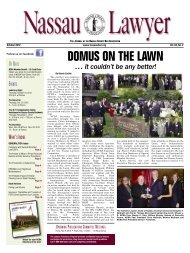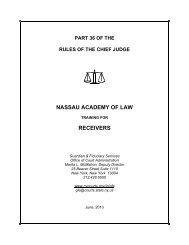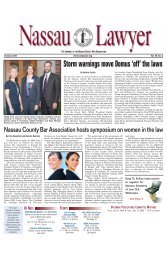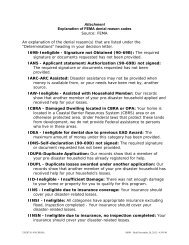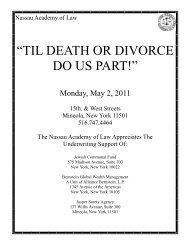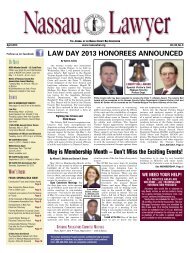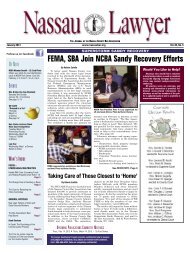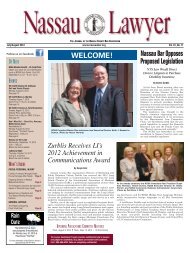302 B.R. 760 Page 8302 B.R. 760(Cite as: 302 B.R. 760)16.On May 30, 2001, Sharp commenced this adversaryproceeding against State Street, alleging: 1) that StateStreet aided and abetted the Spitzes in breaching theirfiduciary duties to the company; 2) that the $12 milliondollar payment State Street received from Sharpin April 1999 constitutes a constructive and/or intentional*769 fraudulent conveyance under the D.C.L.;and 3) that in the event the $12 million dollar paymentis ordered to be returned, State Street's claimsshould be equitably subordinated to the claims <strong>of</strong>Sharp's unsecured creditors. State Street moved todismiss the complaint, relying principally on the followingarguments: 1) that the complaint did not adequatelyplead an aiding and abetting claim underRules 12(b)(6) and 9(b); 2) that the complaint did notstate a claim for intentional or constructive fraudulentconveyance under the D.C.L.; and 3) that becauseSharp's sole <strong>of</strong>ficers--the Spitzes--were the primarywrongdoers in the fraudulent scheme State Street wasaccused <strong>of</strong> aiding and abetting, the doctrine <strong>of</strong> in paridelicto barred the company from obtaining relieffrom third-parties for participating in the scheme.In a Memorandum Decision dated July 30, 2002, theBankruptcy Court granted State Street's motion anddismissed the common law aiding and abetting claimas well as the fraudulent conveyance claims for failureto state a claim. See Sharp Int'l Corp. v. StateStreet Bank & Trust Co. (In re Sharp Int'l Corp. &Sharp Sales Corp.), 281 B.R. 506(Bankr.E.D.N.Y.2002) ( "Bankr.Dec."). These findingsmade it unnecessary for the Bankruptcy Court toreach State Street's in pari delicto defense, or to considerSharp's equitable subordination claim. See id. at524.Standard <strong>of</strong> Review[1] This court has appellate jurisdiction over Sharp'sappeal pursuant to 28 U.S.C. § 158(a). The BankruptcyCourt's dismissal <strong>of</strong> Sharp's complaint forfailure to state a claim is reviewed de novo. See In reMaxwell Communication plc, 186 B.R. 807(S.D.N.Y.1995); see also Americare Health Group,Inc. v. Melillo, 223 B.R. 70, 75 n. 2 (E.D.N.Y.1998)("In reviewing a decision <strong>of</strong> the bankruptcy court, adistrict court applies a de novo standing <strong>of</strong> review toconclusions <strong>of</strong> law ....") (citing In re IonosphereClubs, Inc., 922 F.2d 984, 988 (2d Cir.1990)).Because the motion granted by the Bankruptcy Courtwas a motion to dismiss pursuant to Rule 12(b)(6),the veracity <strong>of</strong> all well-pleaded allegations in Sharp'sadversary complaint must be assumed, and all reasonableinferences must be drawn in the light mostfavorable to Sharp. See Mills v. Polar MolecularCorp., 12 F.3d 1170, 1174 (2d Cir.1993). In reviewinga Rule 12(b)(6) motion, the court's function is to"assess the legal feasibility <strong>of</strong> the complaint, not toassay the weight <strong>of</strong> evidence which might be <strong>of</strong>feredin support there<strong>of</strong>." See Geisler v. Petrocelli, 616F.2d 636, 639 (2d Cir.1980). The inquiry focuses noton "whether a plaintiff will ultimately prevail but onwhether the claimant is entitled to <strong>of</strong>fer evidence tosupport the claims." Scheuer v. Rhodes, 416 U.S.232, 236, 94 S.Ct. 1683, 40 L.Ed.2d 90 (1974). Accordingly,a motion to dismiss a complaint can onlybe granted if "it appears beyond doubt that the plaintiffcan prove no set <strong>of</strong> facts in support <strong>of</strong> [its] claimwhich would entitle [it] to relief." Conley v. Gibson,355 U.S. 41, 45-46, 78 S.Ct. 99, 102, 2 L.Ed.2d 80(1957).Discussion(1)Aiding and Abetting a Breach <strong>of</strong> Fiduciary Duty[2][3] The bankruptcy court dismissed Sharp's claimagainst State Street for aiding and abetting theSpitzes' breaches <strong>of</strong> their fiduciary duties for failureto state a claim under Rule 12(b)(6), finding thatSharp had not adequately pled State Street's knowledge<strong>of</strong> or participation in the Spitzes' wrongdoing.The cause <strong>of</strong> action for aiding and abetting a breach<strong>of</strong> fiduciary duty under New York common law isbased on the well-established principle that "[a]nyonewho knowingly participates *770 with a fiduciary ina breach <strong>of</strong> trust is liable for the full amount <strong>of</strong> thedamage caused thereby to the cestuis que trust."Wechsler v. Bowman, 285 N.Y. 284, 291, 34 N.E.2d322, 326 (1941) (emphasis added). To state a claimfor aiding and abetting a breach <strong>of</strong> fiduciary duty aplaintiff must plead: 1) a breach <strong>of</strong> fiduciary obligationsto another; 2) that the defendant knowingly inducedor participated in the breach; and 3) that theplaintiff suffered damages as a result <strong>of</strong> the breach.See Kaufman v. Cohen, 760 N.Y.S.2d 157, 169, 307A.D.2d 113, 125 (1st Dep't 2003) (citing S & K SalesCo. v. Nike, Inc., 816 F.2d 843, 847-48 (2d Cir.1987)and Whitney v. Citibank, N.A., 782 F.2d 1106, 1115(2d Cir.1986)).© 2009 Thomson Reuters. No Claim to Orig. US Gov. Works.
302 B.R. 760 Page 9302 B.R. 760(Cite as: 302 B.R. 760)[4][5] There is no requirement that the alleged aiderand abetter have an intent to harm. However, to satisfythe knowledge prong, the defendant must haveactual knowledge <strong>of</strong> the primary violator's underlyingbreach <strong>of</strong> fiduciary duty. See Kaufman, 760N.Y.S.2d at 169, 307 A.D.2d at 125. "Constructiveknowledge <strong>of</strong> the breach <strong>of</strong> fiduciary duty by anotheris legally insufficient to impose aiding and abettingliability." Id.[6] Furthermore, to the extent the underlyingbreaches <strong>of</strong> fiduciary duty are based on fraudulentconduct, the complaint must meet the heightenedpleading requirement <strong>of</strong> Rule 9(b) <strong>of</strong> the FederalRules <strong>of</strong> Civil Procedure, which mandates that allallegations <strong>of</strong> fraud be pled with particularity. However,Rule 9(b)'s particularity requirement does notapply to "conditions <strong>of</strong> the mind"--including knowledge--whichmay be averred generally.In this case, the first and third elements <strong>of</strong> the aidingand abetting claim-- an underlying breach <strong>of</strong> a fiduciaryduty and resulting damages--are adequately pledin Sharp's complaint. As <strong>of</strong>ficers <strong>of</strong> Sharp, theSpitzes owed fiduciary duties to the corporation,which they breached by causing Sharp to raise millions<strong>of</strong> dollars through fraudulently inflated financialstatements, and by converting the fraudulently acquiredproceeds as well as other corporate funds totalingin excess <strong>of</strong> $44 million. Further, Sharp wasclearly damaged by the Spitzes' large-scale looting <strong>of</strong>the company--indeed, the Bankruptcy Court has entereda judgment against the Spitzes (and several <strong>of</strong>their companies) jointly and severally in the amount<strong>of</strong> $44,378,650.30.The focus <strong>of</strong> the Bankruptcy Court's opinion--and <strong>of</strong>the parties' arguments in this appeal--concerns StateStreet's "knowing participation" in the Spitzes' conduct.The Bankruptcy Court began its analysis <strong>of</strong> thiselement <strong>of</strong> the aiding and abetting claim by endeavoringto "identify precisely the breach <strong>of</strong> fiduciaryduty for which Sharp seeks to hold State Street liable."Bankr.Dec. at 513. In this connection, theBankruptcy Court concluded that it was necessary todivide the Spitzes' fraud "into two conceptually distinctcategories: (1) causing Sharp to raise millions <strong>of</strong>dollars through fraudulent representations; and (2)unlawfully diverting more than $44 million in Sharpfunds to companies that provided no consideration toSharp." Id. The court further contended that"[a]lthough these two types <strong>of</strong> wrongful conduct mayhave been combined by the Spitzes to form an overallfraudulent scheme, the wrongs are logically separableand give rise to two distinct causes <strong>of</strong> action and todifferent types <strong>of</strong> damages." Id. Moreover, the BankruptcyCourt noted, Sharp's claim against StateStreet--as evidenced by the damages sought in thecomplaint--was based on the Spitzes' looting <strong>of</strong>Sharp, rather than the accounting fraud that facilitatedthe looting. See id.; Compl. 58, "wherefore"clause "a" (seeking damages in excess <strong>of</strong> $19 millionfor the aiding and abetting claim, representing thesums misappropriated by the Spitzes *771 after StateStreet allegedly discovered the scheme).The Bankruptcy Court's analysis <strong>of</strong> Sharp's aidingand abetting claim is, in large part, driven by thisanalytical framework. See id. at 515 ("[The] facts[alleged in Sharp's complaint] at most support aninference that State Street had actual knowledge thatthe Spitzes were fraudulently inflating Sharp's receivables,"not that they were misappropriating corporateassets); id. at 517 ("[E]ven if accepted as adequateto plead that State Street assisted the Spitzes indefrauding the Noteholders, [Sharp's allegations] do [] not support a claim that State Street induced, participatedin, or substantially assisted the Spitzes indiverting monies from Sharp.").Sharp challenges the bankruptcy court's "bifurcation"<strong>of</strong> the Spitzes' fraud, arguing that "the Complaint... sets forth a unified integrated fraud in whichthe Spitzes raised money on behalf <strong>of</strong> Sharp throughfalse pretenses, and then stole that money for theirown purposes." Sharp Mem. in Supp. <strong>of</strong> Appeal("Sharp Mem.") at 17. At least at the pleading stage,plaintiff is correct that the rigid separation <strong>of</strong> thecomponents <strong>of</strong> the Spitzes' scheme for purposes <strong>of</strong>evaluating the adequacy <strong>of</strong> the allegations <strong>of</strong> StateStreet's "knowing participation" is artificial and unwarranted.The fraudulent financial reporting throughwhich the Spitzes induced creditors to loan money toSharp and the Spitzes' embezzlement <strong>of</strong> those andother corporate funds were two steps in a singlescheme. See id. ("[T]he fraud in the falsification <strong>of</strong>Sharp's sales and revenues in order to raise moneywas inextricably linked to the theft <strong>of</strong> monies fromSharp."). Indeed, as discussed infra, in a case such asthis involving a closely-held corporation, the firststep would have been all but pointless without thesecond. Thus, on a motion to dismiss, State Street's© 2009 Thomson Reuters. No Claim to Orig. US Gov. Works.
- Page 1 and 2:
Nassau Academy of LawCLE Live Class
- Page 3 and 4:
McKinney's Debtor and Creditor Law
- Page 5 and 6:
McKinney's Debtor and Creditor Law
- Page 7 and 8: McKinney's Debtor and Creditor Law
- Page 9 and 10: McKinney's Debtor and Creditor Law
- Page 11 and 12: McKinney's Debtor and Creditor Law
- Page 13 and 14: McKinney's Debtor and Creditor Law
- Page 15 and 16: McKinney's Debtor and Creditor Law
- Page 17 and 18: McKinney's Debtor and Creditor Law
- Page 19 and 20: BAKER & HOSTETLER LLP45 Rockefeller
- Page 21 and 22: usiness of defendant Bernard L. Mad
- Page 23 and 24: BACKGROUND, THE TRUSTEE, AND STANDI
- Page 25 and 26: Madoff who received fraudulent tran
- Page 27 and 28: ased on fictitious profits and for
- Page 29 and 30: 28. BLMIS funds were also used to p
- Page 31 and 32: Madoff, and her niece, Shana Madoff
- Page 33 and 34: 42. Ruth Madoff was never an employ
- Page 35 and 36: FIRST CAUSE OF ACTIONTURNOVER AND A
- Page 37 and 38: 66. At the time of each of the Two-
- Page 39 and 40: Transfers; (b) directing that the S
- Page 41 and 42: EIGHTH CAUSE OF ACTIONUNDISCOVERED
- Page 43 and 44: TENTH CAUSE OF ACTIONDISALLOWANCE O
- Page 45 and 46: 111. Mrs. Madoff benefited from the
- Page 47 and 48: WHEREFORE, the Trustee respectfully
- Page 49 and 50: 2(c)(3): (a) preserving the Subsequ
- Page 51 and 52: 302 B.R. 760 Page 1302 B.R. 760(Cit
- Page 53 and 54: 302 B.R. 760 Page 3302 B.R. 760(Cit
- Page 55 and 56: 302 B.R. 760 Page 5302 B.R. 760(Cit
- Page 57: 302 B.R. 760 Page 7302 B.R. 760(Cit
- Page 61 and 62: 302 B.R. 760 Page 11302 B.R. 760(Ci
- Page 63 and 64: 302 B.R. 760 Page 13302 B.R. 760(Ci
- Page 65 and 66: 302 B.R. 760 Page 15302 B.R. 760(Ci
- Page 67 and 68: 302 B.R. 760 Page 17302 B.R. 760(Ci
- Page 69 and 70: 302 B.R. 760 Page 19302 B.R. 760(Ci
- Page 71 and 72: 394 B.R. 721 Page 1394 B.R. 721, 50
- Page 73 and 74: 394 B.R. 721 Page 3394 B.R. 721, 50
- Page 75 and 76: 394 B.R. 721 Page 5394 B.R. 721, 50
- Page 77 and 78: 394 B.R. 721 Page 7394 B.R. 721, 50
- Page 79 and 80: 394 B.R. 721 Page 9394 B.R. 721, 50
- Page 81 and 82: 394 B.R. 721 Page 11394 B.R. 721, 5
- Page 83 and 84: 394 B.R. 721 Page 13394 B.R. 721, 5
- Page 85 and 86: 394 B.R. 721 Page 15394 B.R. 721, 5
- Page 87 and 88: 394 B.R. 721 Page 17394 B.R. 721, 5
- Page 89 and 90: 394 B.R. 721 Page 19394 B.R. 721, 5
- Page 91 and 92: 394 B.R. 721 Page 21394 B.R. 721, 5
- Page 93 and 94: 397 B.R. 642 Page 2397 B.R. 642(Cit
- Page 95 and 96: 397 B.R. 642 Page 4397 B.R. 642(Cit
- Page 97 and 98: 397 B.R. 642 Page 6397 B.R. 642(Cit
- Page 99 and 100: 397 B.R. 642 Page 8397 B.R. 642(Cit
- Page 101 and 102: 397 B.R. 642 Page 10397 B.R. 642(Ci
- Page 103 and 104: 397 B.R. 642 Page 12397 B.R. 642(Ci
- Page 105 and 106: 397 B.R. 642 Page 14397 B.R. 642(Ci
- Page 107 and 108: 443 F.3d 180 Page 2443 F.3d 180(Cit
- Page 109 and 110:
443 F.3d 180 Page 4443 F.3d 180(Cit
- Page 111 and 112:
443 F.3d 180 Page 6443 F.3d 180(Cit
- Page 113 and 114:
443 F.3d 180 Page 8443 F.3d 180(Cit
- Page 115 and 116:
443 F.3d 180 Page 10443 F.3d 180(Ci
- Page 117 and 118:
443 F.3d 180 Page 12443 F.3d 180(Ci
- Page 119 and 120:
Page 2257 A.D.2d 526, 684 N.Y.S.2d
- Page 121 and 122:
Page 4257 A.D.2d 526, 684 N.Y.S.2d
- Page 123 and 124:
Page 6257 A.D.2d 526, 684 N.Y.S.2d
- Page 125 and 126:
770 N.Y.S.2d 421 Page 22 A.D.3d 780
- Page 127 and 128:
Page 14 A.D.3d 495, 773 N.Y.S.2d 71
- Page 129:
Page 34 A.D.3d 495, 773 N.Y.S.2d 71
- Page 132 and 133:
780 N.Y.S.2d 409 Page 29 A.D.3d 553
- Page 134 and 135:
Page 134 A.D.3d 231, 824 N.Y.S.2d 3
- Page 136 and 137:
Page 334 A.D.3d 231, 824 N.Y.S.2d 3
- Page 138 and 139:
Page 2991 F.2d 31(Cite as: 991 F.2d
- Page 140 and 141:
Page 4991 F.2d 31(Cite as: 991 F.2d
- Page 142 and 143:
Page 6991 F.2d 31(Cite as: 991 F.2d
- Page 144 and 145:
FRAUDULENT TRANFERENCESRonald M. Te
- Page 146 and 147:
Nursing home case_ Transfer of pers
- Page 148 and 149:
Sections 548 and 544 work in concer
- Page 150 and 151:
U.S. Supreme CourtBFP v. Resolution
- Page 152 and 153:
example, from net 15 to COD; or cha
- Page 154 and 155:
Bankruptcy Code Section§ 548. Frau
- Page 156:
Ron Terenzi is a founding partner a



